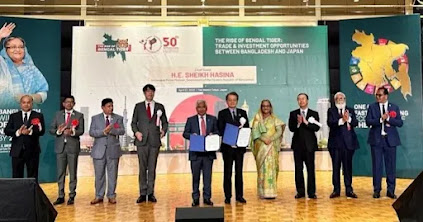Prominent industrialists of the nation have rallied in support of the government against the purported transgressions by the BNP-Jamaat coalition, who are allegedly exploiting the student quota reform agitation. These magnates have unequivocally aligned themselves with Prime Minister Sheikh Hasina, asserting their commitment to advancing Bangladesh. They proclaimed that, from Teknaf to Tentulia, a staggering three crore entrepreneurs stand steadfastly with Prime Minister Sheikh Hasina, mirroring past loyalties and pledging their unwavering support in the quest for a prosperous and Smart Bangladesh.
This endorsement came during a discourse at the Prime Minister's Office, where influential figures from various paramount trade associations assured the Prime Minister of their allegiance. Mahbubul Alam, the President of the Federation of Bangladesh Chamber of Commerce and Industry (FBCCI), the preeminent trade organization, articulated, "Over three crore entrepreneurs, spanning from Teknaf to Tentulia, have historically supported you, Prime Minister. We continue to do so and shall remain by your side in the future as well." He extolled Sheikh Hasina’s tenure, noting the transformation of Bangladesh’s economy from a mere $70 billion GDP to a robust $400 billion GDP. "You have consistently met our demands, emphasizing that while the government does not engage in business, it facilitates business activities, which you have diligently done for us." Addressing the nationwide turmoil incited by the BNP-Jamaat, the FBCCI President remarked that the vanquished factions of 1971 are discomfited by infrastructural advancements such as the metro rail, Bangabandhu tunnel, and Padma Bridge. "They aim to render Bangladesh a failed state," he lamented.
SM Mannan Kochi, President of the BGMEA, acknowledged the Prime Minister’s support during crises such as the COVID-19 pandemic, reiterating their allegiance amid the current upheaval orchestrated by the BNP-Jamaat faction under the guise of the student quota reform movement to destabilize the nation and harm Prime Minister Sheikh Hasina. "We will stand by you, Sheikh Hasina, even at the cost of our lives, as your love for the country and its people has elevated Bangladesh to a developing nation," he affirmed. He reiterated the BGMEA’s continued support for the Prime Minister.
Nazrul Islam Majumdar, President of the Bankers Association of Bangladesh (BAB), condemned the chaos and violence as disgraceful and detrimental to the nation, labeling it an orchestrated crime. "BAB has always supported you, Prime Minister, and will continue to do so. We are committed to realizing all your initiatives," he declared. Helal Uddin, President of the Shop Owners' Association, reaffirmed their trust in the Prime Minister, expressing confidence in her ability to restore a conducive environment for traders, dubbing her a "crisis master."
Syed Nasim Manzoor, President of the Leather Goods and Footwear Manufacturers and Exporters Association of Bangladesh, called on the Prime Minister to ensure the anarchists face legal consequences and appropriate punishment. Ahmed Akbar Sobhan, Chairman of Basundhara Group, emphasized the need for stringent action against the BNP-Jamaat anarchists, arguing that past punitive measures could have prevented the current unrest.
The session was moderated by PM's Adviser Salman F Rahman.
.jpg)
.jpg)

